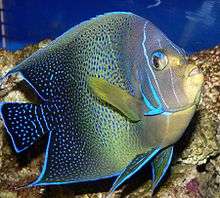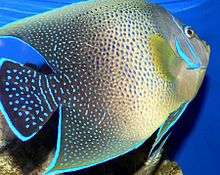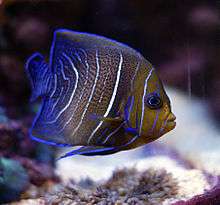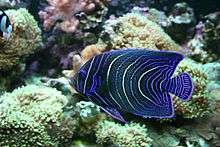Pomacanthus semicirculatus
Pomacanthus semicirculatus, the Koran angelfish or semicircle angelfish, is a ray-finned fish in the family Pomacanthidae. It is found in the Indo-West Pacific Ocean.[2] It occasionally makes its way into the aquarium trade.
| Semicircle angelfish | |
|---|---|
 | |
| Scientific classification | |
| Kingdom: | Animalia |
| Phylum: | Chordata |
| Class: | Actinopterygii |
| Order: | Perciformes |
| Family: | Pomacanthidae |
| Genus: | Pomacanthus |
| Species: | P. semicirculatus |
| Binomial name | |
| Pomacanthus semicirculatus | |
| Synonyms[1] | |
| |
Description

The adult semicircle angelfish is a pale brownish-green colour. It is a deep-bodied, laterally compressed fish that can grow to a length of 35 centimetres (14 in). The mouth is positioned just above the tip of the snout, and the eyes are set halfway up a long straight forehead. The scales have blue bases which gives the body a speckled effect. The fins, except for the pectorals, are rimmed in blue and so are the cheek, operculum and spine. The dorsal fin has 13 spines and 20–23 soft rays and the anal fin has 3 spines and 18–22 soft rays. Both these fins have filaments that trail behind as the fish swims. The pectoral fins are pale yellow and have 19–21 soft rays.


The juveniles in contrast, are blue-black marked from top to bottom with narrow white stripes. At the head end the stripes are fairly straight but they become increasingly curved as they approach the base of the tail. The juveniles gradually adopt the adult colouration when they are 8 to 16 centimetres (3.1 to 6.3 in).[3]
Distribution
The semicircle angelfish is found in the Indo-Pacific region. Its range extends from the east coast of Africa to Fiji and Japan, the east coast of Australia and New Caledonia. It has also been seen sporadically off the east coast of Florida since 1999 and at Oahu, Hawaii since 2005.[3]
Biology
The semicircle angelfish is found on sheltered coral reefs, where it feeds on algae, tunicates and sponges. The juveniles are very timid and difficult to approach.[3]
References
- Bailly, Nicolas (2010). "Pomacanthus semicirculatus (Cuvier, 1831)". WoRMS. World Register of Marine Species. Retrieved 2012-02-27.
- Froese, Rainer and Pauly, Daniel, eds. (2008). "Pomacanthus semicirculatus" in FishBase. December 2008 version.
- Pomacanthus semicirculatus (Cuvier, 1831): Semicircle Angelfish USGS. Retrieved 2012-02-27.
External links
- Photos of Pomacanthus semicirculatus on Sealife Collection
| Wikimedia Commons has media related to Pomacanthus semicirculatus. |
| Wikispecies has information related to Pomacanthus semicirculatus |
